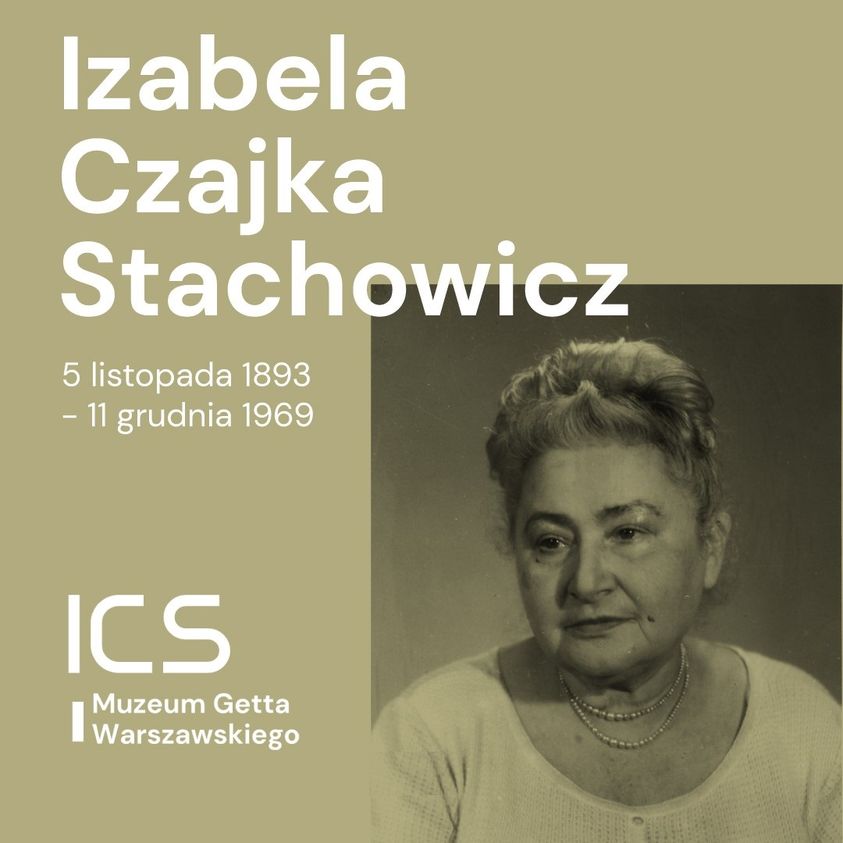Izabela Czajka Stachowicz (05.11.1893–11.12.1969)
writer, chronicler of the life of interwar Warsaw, muse of artists, honored with the Knight’s Cross of the Order of Polonia Restituta

Bella Szwarc – this, after all, was her real name – was probably born on November 5, 1898 in Sosnowiec. She came from a wealthy Jewish home. “My father was very wise, very unbalanced, and went his own ways. I knew he loved me above all else, he was my rock, my protection and my armor. ”
As a little girl, she moved to Warsaw along with her whole family. She learned several foreign languages from an exclusive girls school in the capital, then she studied at the Faculty of Philosophy of the University of Warsaw. During this period, she met many young writers and scholars. The most important of them was Aleksander Hertz, a member of the PPS party and a student of sociology. While Bella’s father did not agree to her marriage with Hertz for a long time, her fiancé finally convinced her father by agreeing, despite his atheism, to a traditional Jewish wedding. The ceremony took place in 1920. Aleksander Hertz’s dedication to his academic work prevented their marriage from lasting too long. After their divorce, she left for Paris, where she met her second husband, the eminent architect Jerzy Gelbard.
Her experiences during the occupation were extraordinary. She survived the ghetto in Warsaw, where she was seriously ill with typhus. The painter Roman Kramsztyk also hid with her and her husband in an apartment on Sienna Street. Bella wrote poetry and ran a cafe, where Wiera Gran performed.
“Bella, who had a head like a prestidigitator throwing live rabbits out from under a cylinder, one fantastic idea chased another, started writing ghetto poems, started singing songs from the courtyard, founded a cafe where people came to hear something, to meet, where there were appearances of normal life, on the burning ashes,” described Janina Kruszewska, cousin of Jerzy Gelbard, of the atmosphere of those tragic days. “There, sometimes piano amateurs would sit and play concerts by Beethoveen and Chopin’s Revolutionary, and Bach, who reminded us that there is God somewhere “.
Upon hearing of the plans to exterminate, Gelbard fled, and the day before the liquidation helped Chaika escape. He died soon in Majdanek, and Bella herself was later sent to the Otwock ghetto. In the end, she had to hide in the countryside, saved by the teenage daughter of a blacksmith, Danusia. Her father got false papers for his sister: “Kennkarte (identification) for Stefania Czajka, from the mother of Nepomuk Czajka, an unknown father. This is how Czajka was born”. She described her, sometimes quite improbable, wartime experiences in the book “The Blacksmith Saved Me”, explaining her survival as “an ardent need to survive, to bear witness to the truth.”
She described her further fate as follows: “I was hiding in the forest, then with the army, then with the guerrillas in the forests of Legionowo, then in Lublin, and still later with the Citizens’ Militia in Katowice.” In 1944 she became a member of the People’s Army. After the war, she moved to Katowice, worked in the MO (Citizens’ Militia) headquarters and probably then met her third husband, Władysław Stachowicz, known as “Czajnik”. The third marriage turned out to be the longest. She stopped working in the militia in 1946. It was then that her first book after the war, Songs of the Funeral Ghettos, was published, and her poems during the occupation, based on authentic stories of the murdered, were among others a tribute to her great-uncle, Izucher Szwarc. The post-war period saw Bella newly incarnated as a writer. Although she made her debut before the war, she wrote as many as nine autobiographical novels afterwards. She described her books herself: “I unwrap the movie of my life, nothing more, I unwrap the roll of the movie. I really don’t hide anything in these memories, I swear I’m not lying.
Artur Sandauer recalled: “She was among the people of power she knew, but she was definitely on the side of the opposition. After 1968 she was very hostile to the government. ” This was even reflected in secret reports: “In the literary milieu of Warsaw, she carried out politically harmful activities from a revisionist and Zionist position.” At the very end of her life, she became the target of an anti-Semitic witch-hunt. Ryszard Gontarz criticized her pro-Israeli views in the Sztandar Młodych newspaper. She was afraid of pogroms, but she helped those arrested materially in the March 1968 incidents. She did not live to see the publication of her last book, in which she described her stay in pre-war Paris. She died on December 11, 1969. Sabina Sebyłowa summed up her character: “Her boiling temperament attracted general attention. Bella knew everyone. It was like a joyful epidemic, everyone succumbed to it.”
translated by Adam Grossman

